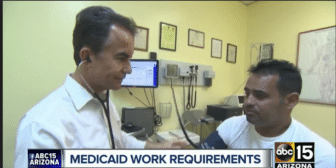In January 2019, the Arizona Health Care Cost Containment System (AHCCCS), Arizona’s Medicaid program, received approval from the Centers for Medicare and Medicaid Services (CMS) to implement work requirements for participants. These work requirements (called AHCCCS Works Community Engagement) can be implemented no sooner than January 2020, but AHCCCS has stated publicly that it is targeting a launch date in the summer of 2020.
 The program requires AHCCCS members who are able-bodied, age 19–49, and not otherwise exempt to engage in at least 80 hours per month of the following activities and report them on a monthly basis: employment; part-time education; job or life-skills training; job-search activities; or community service. Reasons AHCCCS members would qualify for an exemption from these work requirements include: pregnancy (up to 60 days post-pregnancy); former foster youth (up to age 26); member of a federally recognized tribe; designated caretaker of a child under 18 or person with a disability; serious mental illness; medically frail; an acute medical condition; active treatment for a substance-use disorder; a disability recognized under federal law; full-time student in high school, college, or trade school; survivor of domestic violence; homeless; participating in another AHCCCS-approved work program; and receiving assistance through the Supplemental Nutrition Assistance Program (SNAP, formerly food stamps), Temporary Assistance for Needy Families (TANF), and Unemployment Insurance (UI).
The program requires AHCCCS members who are able-bodied, age 19–49, and not otherwise exempt to engage in at least 80 hours per month of the following activities and report them on a monthly basis: employment; part-time education; job or life-skills training; job-search activities; or community service. Reasons AHCCCS members would qualify for an exemption from these work requirements include: pregnancy (up to 60 days post-pregnancy); former foster youth (up to age 26); member of a federally recognized tribe; designated caretaker of a child under 18 or person with a disability; serious mental illness; medically frail; an acute medical condition; active treatment for a substance-use disorder; a disability recognized under federal law; full-time student in high school, college, or trade school; survivor of domestic violence; homeless; participating in another AHCCCS-approved work program; and receiving assistance through the Supplemental Nutrition Assistance Program (SNAP, formerly food stamps), Temporary Assistance for Needy Families (TANF), and Unemployment Insurance (UI).
Earlier this year, similar work requirements were proposed by the US Department of Agriculture (USDA) for able-bodied adults without dependents participating in SNAP. This proposal would have forced up to 50,000 Arizonans into food insecurity by time-limiting their nutrition assistance. Based on decades of experience helping Arizonans facing hunger, the Association of Arizona Food Banks (AAFB) and our member food banks strongly opposed these proposed time limits. Below are the key points we shared with the USDA, and these same concerns exist for AHCCCS Works.
We believe adequate nutrition is necessary for a strong economy. In Arizona, 71 percent of SNAP participants are either children (45 percent), elderly (11 percent), or disabled (15 percent), according to May 2019 data from the Department of Economic Security (DES). The remaining 30 percent of SNAP participants are either exempt from work under federal regulations or working. These vulnerable workers need SNAP to support their employment, and limiting their access to nutrition will not improve their chances at finding or maintaining employment. Rural and tribal communities would be particularly impacted by time-limiting their SNAP benefits based on employment, given how few employment opportunities are available and the narrow scope of career pathways in these areas. SNAP retailers in tribal and rural communities would also be negatively affected by the loss of SNAP. The burden of paperwork and the possibility that government could fail in implementation would result in more people losing nutrition assistance. Allowing SNAP to operate as designed—that is, to be highly responsive in times of crisis and disaster—is imperative for economic recovery.
The resources available to support people who lose SNAP would be limited. Employers and training programs would struggle to put individuals to work in such a short timeframe. Food banks would struggle to meet the need. Our network would be asked to both provide volunteer opportunities for people to meet compliance and emergency food relief; failure to comply with work requirements could leave our network in the position of gatekeeper to people’s food access.
AAFB POSITION STATEMENT: Reliable access to health care is not only critical to individual health and well-being but also to community development, workplace productivity, and economic stability. Variabilities in coverage can leave working families without the care they need to stay healthy, thrive, and contribute to their communities.
Health and nutrition go hand-in-hand, as do hunger and poverty. Food bank clients who do not have access to health insurance (through the Arizona Health Care Cost Containment System, or AHCCCS) or nutrition assistance (through the Supplemental Nutrition Assistance Program, or SNAP) are often forced to choose between buying groceries and paying their medical bills each month. This often results in skipped meals or skipped medications, compromising a person’s health overall.
The Association of Arizona Food Banks (AAFB) and its members want to ensure that the implementation of the AHCCCS Works Community Engagement Program does not contribute to higher levels of food insecurity across Arizona. Work requirements already exist for other public benefit programs, and it’s unclear whether compliance with one program’s requirements will suffice for another program and whether state agencies will communicate compliance from one program to the next. If there are challenges or errors in the communication of compliance, it could potentially result in lost health care coverage for people who are already struggling to make ends meet.
We also want to ensure that AHCCCS Works is implemented in a way that holds food banks and partner agencies harmless with regards to monitoring community engagement hours. Food banks do not want to play a role in whether a person is granted or denied health care coverage. We know that AHCCCS is critical for many of our food bank clients and SNAP participants to receive treatment and nutrition education for diet-related illnesses, including diabetes and hypertension.
Questions? Contact: Ashley St. Thomas, Public Policy Manager | [email protected] | 602-775-5035
